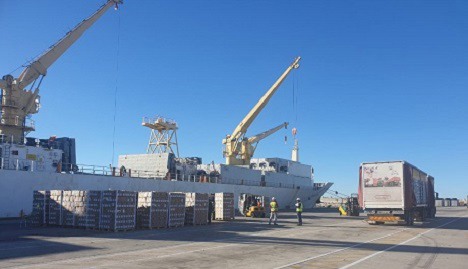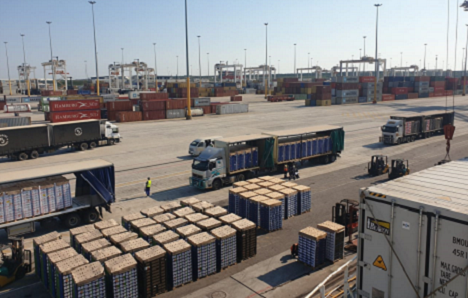For the moment port activities in South Africa haven’t been particularly hampered by a shortage of containers, certainly not more than by Cape Town’s famous south easterly wind that caused a standstill of several days about three weeks ago or the municipal road closures around Durban’s container terminals the following week, but the industry is wondering how long that’s going to last. Empty containers are coming in sporadically and when they do, shipments are sometimes divided between ships.
Plum producers who have about a month left on late plums hope they’ll be able to bow out before acute shortages start manifesting, while the grape industry is relieved to be entering into their final straight.
The citrus industry could feel full impact
“What we’re seeing now is the tip of the iceberg,” says Charles Gantz, of Anlin Shipping: their specialised reefer vessels will be exempt from possible future container shortages. The few containers on-deck they own themselves, while below-deck fruit are packed in pallets under optimally managed temperature control. Sixty to seventy percent of South African citrus for the United States are sent in this way, and the same proportion of the fruit trade with Russia.
“We are still loading 5,000 to 6,000 pallets a week during the citrus season, our service is continuing. I think it is going to take four to six months for the shipping industry to completely recover from current and potential future disruptions and by that time, the citrus season will be over.”
 Pallets being loaded onto a specialised reefer vessel
Pallets being loaded onto a specialised reefer vessel
He wishes, he says, that more of the South African fruit industry would try their service – their superior record on management of cold damage risk is supported by Citrus Research International, he points out.
Along with their Russian shipments on a specialised reefer vessel, there sits 5% of South Africa’s European shipments. “It’s on the same line, so we have space, we have the capacity, and we will be unaffected by a possible shortage in containers. We operate from exclusive privately owned and operated terminal operators.”
Acute shortage could develop in Durban
He’s sceptical of claims that there are sufficient available containers in the system for the months ahead and he expects a shortage to develop particularly at Durban.
He advises exporters to contact local container depots and container lines themselves and ask whether there are sufficient containers. “That is, if they’ll be playing open cards with you. In my opinion, I think some people are in denial and claiming or hoping there’ll be enough containers.”
“You have to remember: empty containers now have to come back from China to enter the north-south leg, that means back to Europe, because there’s little trade movement between China and South Africa at the moment. Or containers are sitting at transhipment centres.”
Only five per cent of the South African fruit industry currently make use of the specialised reefer vessel option to Europe. This might be the year when their ranks grow, by necessity.

For more information:
 Charles Gantz
Charles Gantz
Anlin Shipping (as agents only)
Tel: +27 82 887 2911
Email: charles@anlin.co.za
www.anlin.co.za
